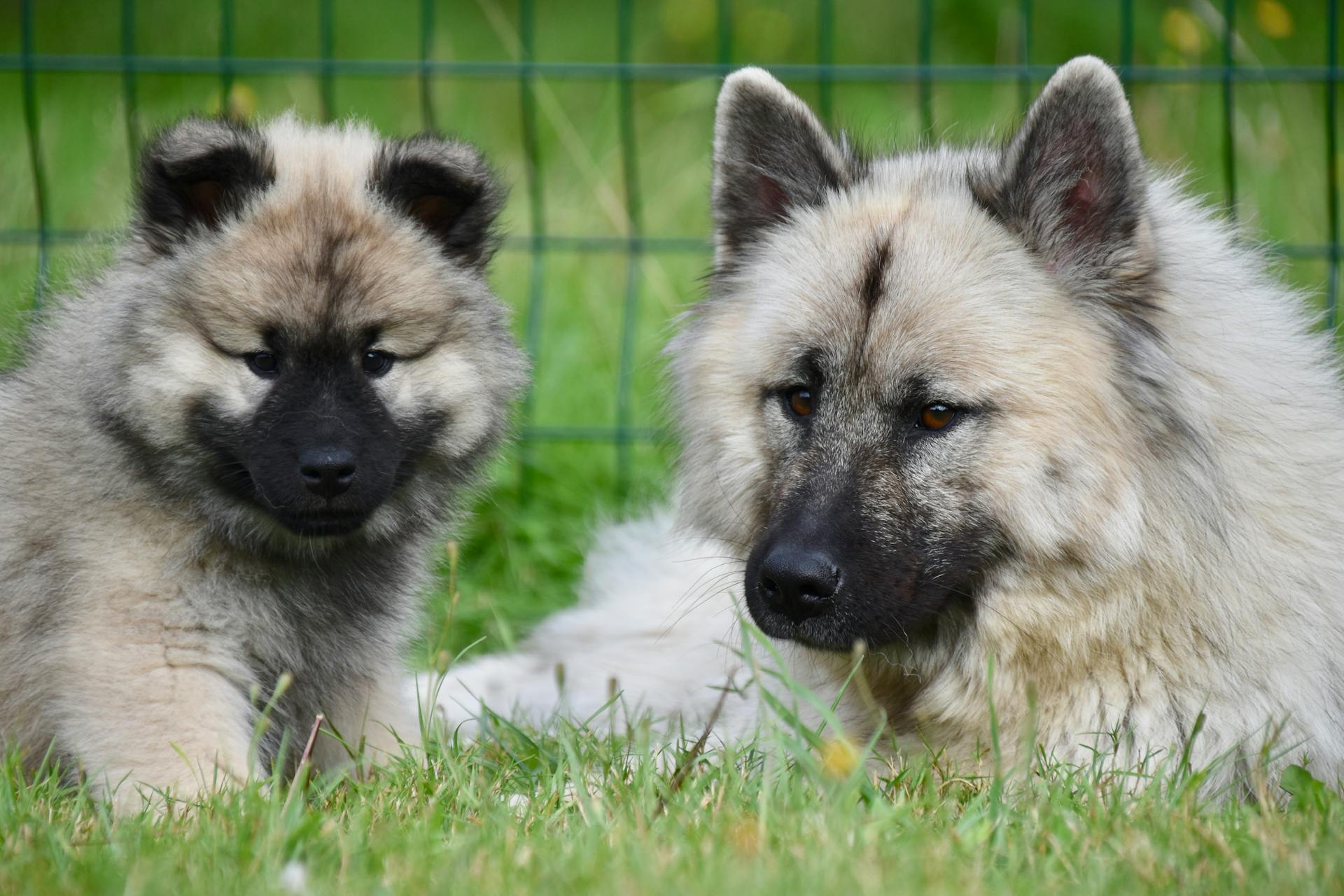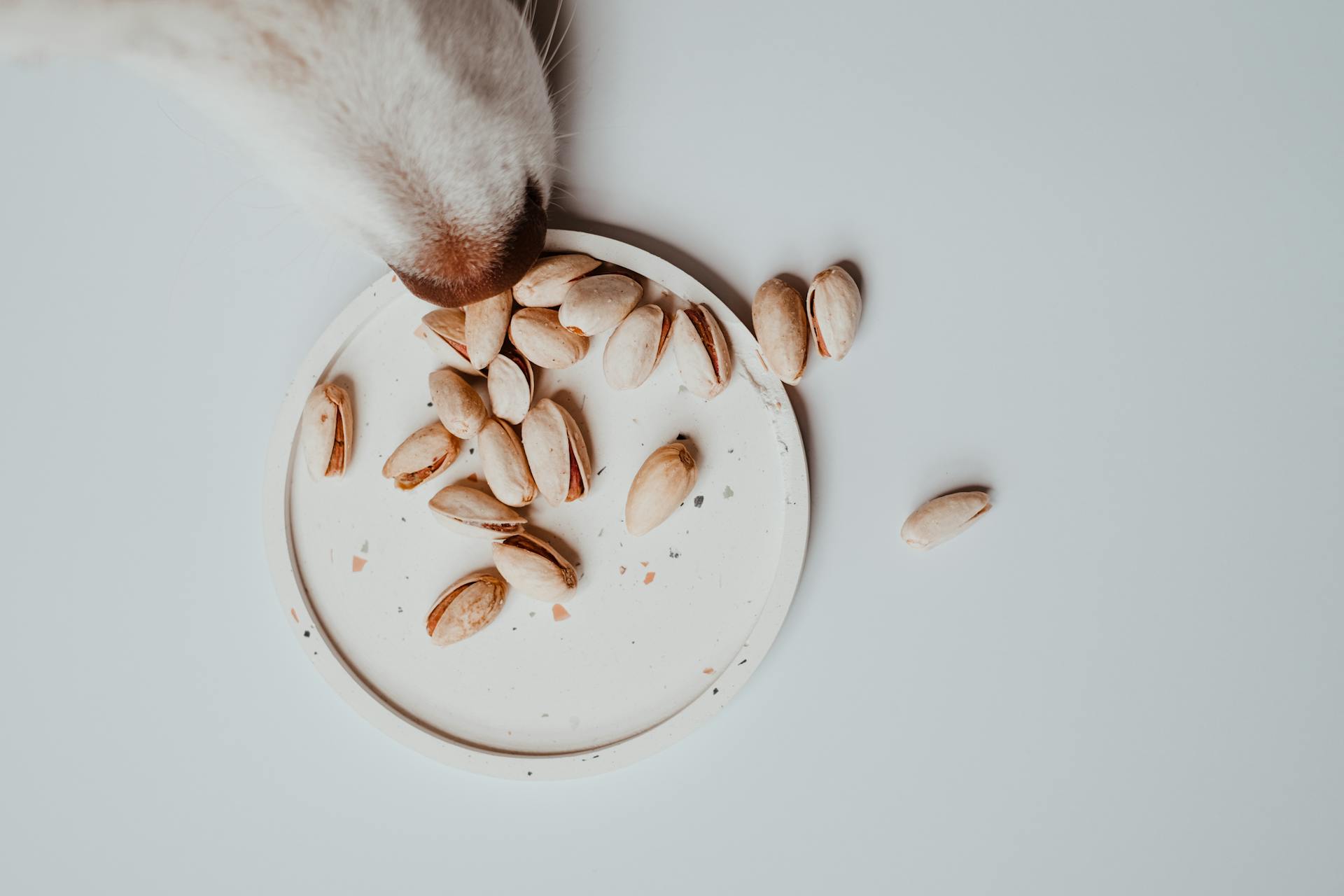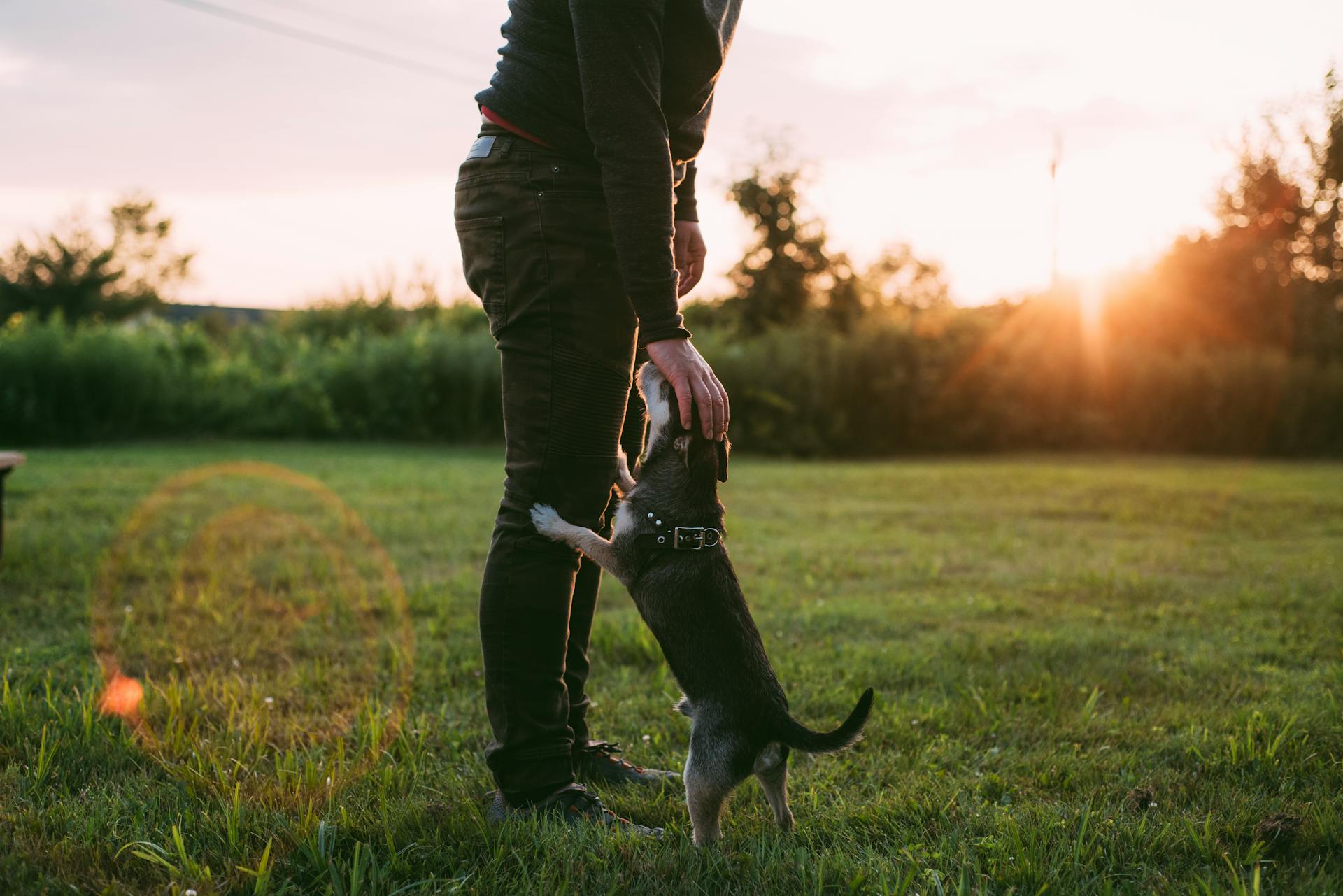
Dogs spitting out food can be frustrating for pet owners, but it's a common issue that can be caused by several factors. One possible reason is that your dog is swallowing air while eating, which can lead to discomfort and the tendency to spit out food.
If your dog is swallowing air, you can try feeding them slowly and in small amounts to prevent gulping. This can help reduce the amount of air they ingest.
Some breeds are more prone to spitting out food than others, with Bulldogs and Pugs being common examples. These breeds often have narrow tracheas and can easily inhale food particles while eating.
If your dog is spitting out food due to a narrow trachea, your veterinarian may recommend feeding them in a more upright position to reduce the risk of inhaling food particles.
Causes of Vomiting
Dogs spit out food for a variety of reasons, and it's not always easy to figure out what's causing the issue.
One of the most common causes of vomiting in dogs is eating something they shouldn't have, also known as a dietary indiscretion. The ASPCA Animal Poison Control Center received over 232,000 calls about pets who ingested toxins in just one year.
Motion sickness can also cause vomiting in dogs, so if you're planning a road trip with your furry friend, be sure to take precautions.
Parasites, eating too fast, viral infections, and chronic health conditions are other common causes of vomiting in dogs.
If your dog is vomiting, it's essential to take a closer look at the vomit to determine the underlying cause. The color, texture, and odor of the vomit can reveal important clues.
Chunky vomit can indicate that your dog ate something unauthorized, and the color and texture will vary depending on what they consumed.
Dark brown or black vomit is a sign that there's blood mixed in with the throwup, and it's time to call the vet.
Strong-smelling vomit can be a sign of canine parvovirus or necrotic tissue, both of which require immediate veterinary attention.
Liquidy yellow or green vomit can be a sign that your dog is hungry or has a foreign object stuck in their stomach.
If your dog is throwing up after eating, it could be due to a few common causes, including eating too fast, eating something that doesn't agree with them, or even a food allergy.
Take a look at this: What Food Gives Dogs Diarrhea
Symptoms and Behavior
Dogs that spit out food often display a range of unusual behaviors. They may stop eating mid-meal, only to start again later.
If your dog is a picky eater, they might be more prone to spitting out food. Some common signs of a picky eater include turning their head away from their food bowl, sniffing it before eating, or eating very slowly.
In some cases, dogs may spit out food due to a medical issue, such as dental problems or gastrointestinal upset.
Recommended read: Dog Throwing up Spit
What Your Vomit Is Saying
Your dog's vomit is more than just a mess on the carpet - it's a potential indicator of what's going on inside their body.
Chunky vomit can be a sign that your dog ate something they shouldn't have, with the color and texture varying depending on what they consumed.
Dark brown or black vomit is a cause for concern, as it may indicate blood is mixed in with the throw-up. If you see this color, it's time to call the vet.

Strong-smelling vomit can be a sign of a serious issue, such as canine parvovirus or necrotic tissue.
Liquidy yellow or green vomit that looks like foam is often bile, which can be a sign that your dog is hungry or has a foreign object stuck in their stomach.
If your dog is vomiting frequently, watch out for blood in their bile, as this can be a sign of a serious issue that requires veterinary attention.
A veterinarian can help identify the cause of your dog's vomiting, but common reasons include eating something they shouldn't have, food sensitivities, or gastrointestinal issues.
Not Like Him Anymore
If your dog's eating habits have changed, it's possible that something is bothering them. Changes in their environment can cause dogs to stop eating.
Stress can also be a factor, and it's not uncommon for dogs to develop anxiety in response to changes at home.
An adverse reaction to drugs or nausea can also cause a dog to lose their appetite.
Dental problems can make eating uncomfortable for your dog, leading them to turn up their nose at their food.
Pain or internal obstructions can also cause a dog to stop eating, and it's essential to rule out these possibilities with a vet.
Take a look at this: How to Stop Dog from Eating Other Dogs Food
Prevention and Diet

Dietary changes can make a big difference in preventing dogs from spitting out food. A nutritionally balanced, whole-food meal option that's lower in fat can ease a dog's troubled tummy.
Your veterinarian may recommend a change in your dog's diet to address underlying conditions that could be causing vomiting. Dogs with sensitive stomachs, food allergies, or chronic diseases like pancreatitis are often prone to vomiting.
Switching to a novel protein like venison or pork can remedy regurgitation issues and vomiting episodes. This is because some dogs have sensitivities to common proteins.
Low-residue dog foods are another option to ease gastrointestinal tract distress. These foods are typically low-fiber, easily digestible, and designed to maximize nutrient absorption without causing digestive upset.
Broaden your view: Foods for Dogs with Diabetes
Eating Too Quickly
Feeding your dog a measured meal pace can contribute to a happier, healthier dog.
If your dog is consuming meals too rapidly, it can result in digestive discomfort, increasing the risks of indigestion, throwing up food, and potentially choking, or even aspiration.

Eating too fast is the most common reason why dogs throw up undigested food, and it often happens without warning signs like retching.
Regurgitation from eating too fast is rarely a cause for concern, but it's essential to address the issue to prevent future problems.
Feeding your dog smaller, more frequent meals or using a puzzle dish can help them slow down at mealtimes and reduce the risk of regurgitation.
Monitoring your dog's eating habits and adjusting their meal schedule accordingly can make a significant difference in their digestive health.
Prevention of Vomiting
Feeding your dog the right amount of food can make a big difference in preventing vomiting. Be sure to monitor his eating to ensure he's not gobbling down his food too quickly.
Older dogs may benefit from eating smaller amounts at a time. This can help prevent regurgitation and make mealtime more comfortable for them.
Dry food can be a culprit behind vomiting, so switching to a wet food may be a good option. Consult with your veterinarian to see if this is a viable solution for your furry friend.

If your dog has a sensitive stomach or food allergies, a change in diet may be necessary. Your veterinarian can recommend a nutritionally balanced, whole-food meal option that's lower in fat.
Some dogs are sensitive to common proteins, so switching to a novel protein like venison or pork may help remedy regurgitation issues.
Understanding Vomiting
Vomiting is an active process that involves multiple symptoms, including salivating, pacing, abdominal contractions, and retching, which signal that your dog is about to vomit.
Regurgitation, on the other hand, is often a result of eating too much or too fast, and the food goes in and comes right back up undigested.
The most common causes of vomiting are varied, and can include swallowing something unwanted, like a sock, or even a medical condition like diabetes or cancer.
If your dog is vomiting after eating, it's essential to have an evaluation by your veterinarian to identify the cause.
In some cases, vomiting can be a sign of an underlying health issue, such as gastritis (stomach inflammation), food allergies, or other causes.
If your dog is persistently throwing up food, it's time to consult your veterinarian, as chronic vomiting could be a sign of more serious conditions that require professional attention.
Here are some possible reasons why your dog might vomit after eating:
- Eating from the trash can
- Swallowing a sock
- Intestinal parasites
- Viral infections
- Chronic conditions like diabetes and cancer
Troubleshooting and Solutions
Dogs spitting out food can be frustrating for both you and your furry friend.
One common reason for this behavior is that your dog is eating too quickly, which can cause food to get stuck in their throat or make them uncomfortable.
Make sure to feed your dog in a quiet and distraction-free area to help them eat at a slower pace.
If your dog is experiencing anxiety or stress while eating, it may be causing them to spit out their food.
Pet Not Eating, Will Eat Treats
If your dog is not eating its regular food but will happily gobble treats and scraps off the table, it may be a sign that it's picking unhealthy foods over its own food.
If your dog is turning up its nose at dinner but happily gobbling treats and scraps off the table, you may want to consider if they're picking unhealthy foods over its own food.
Other symptoms of illness, such as vomiting or diarrhea, could be behind this change in appetite, so keep an eye out for those as well.
Worth a look: Dog Bites Fingers When Taking Treats
Stopping Vomiting
If your dog is vomiting food, it's essential to address the issue promptly.
Consider adjusting your dog's feeding routine to smaller, more frequent meals to discourage rapid consumption, a common culprit in regurgitation.
You can also introduce specialized slow-feed bowls to promote a measured pace, which can help your dog eat more comfortably.
Hydration plays an important role in digestion, so ensure your companion has access to fresh water throughout the day.
Observing your dog's mealtime manners can help identify any causes of throwing up undigested food, such as scavenging or consuming non-food items.
If the issue persists, consult your veterinarian to rule out any underlying health concerns.
Common Issues and Concerns
Dogs may spit out food due to a medical issue such as gastrointestinal foreign bodies, which can cause vomiting and regurgitation.
Some common issues that may lead to food spitting out include dental problems like gum disease or tooth abscesses, which can cause pain and discomfort while eating.
Other concerns include eating too quickly, which can lead to swallowing air and subsequent regurgitation, as seen in the case of a dog that ate a meal in under 5 minutes.
Dog Drops Food Before Eating
Dogs may drop their food on the floor before eating it due to instinctual behaviors or personal preferences. This behavior could be an innate trait related to their wild ancestors who would bury excess food for later consumption.
Some dogs might develop this habit due to a desire for a cleaner eating area. This is because they may be naturally inclined to keep their food clean and free from debris.
It's also possible that your dog drops his food on the floor to enhance the texture or taste of the food. This is a habit that can be developed for various reasons, and it's not uncommon to see dogs exhibiting this behavior.
Scattering Food

Scattering food is a common behavior in dogs, especially in puppies, due to their natural instinct to hide food for later to prevent other animals from getting it.
This behavior is not a sign of any problems, so you don't need to worry if your dog is scattering their food.
Scattering is likely to subside over time as the dog grows and matures, so be patient and give your dog time to develop.
Something is Wrong
Dogs can be quite particular about their food, and sometimes they'll spit it out if something is off.
You should always check the validity of the food you feed your dog, as expired or spoiled food can lead to food poisoning.
Most store-bought or home-cooked food has a shelf life, and it's essential to be aware of the expiration date to avoid any issues.
It's not uncommon for dogs to be picky eaters, but if your dog consistently spits out food or refuses to eat, it's worth investigating further.
If your dog doesn't continue eating, it's a sign that something is wrong, and you should take action to address the issue.
Checking the food regularly can save you and your dog a lot of stress and potential health problems.
Sources
- https://caninecarecentral.com/behavior/dog-puts-food-in-its-mouth-then-spits-it-out/
- https://www.newsweek.com/dog-picky-eater-food-habit-tiktok-1857002
- https://wagwalking.com/symptom/why-is-my-dog-throwing-up-food
- https://www.justfoodfordogs.com/blog/why-is-my-dog-throwing-up.html
- https://www.vetniquelabs.com/blogs/vets-corner/why-is-my-dog-throwing-up-undigested-food-vetnique
Featured Images: pexels.com


